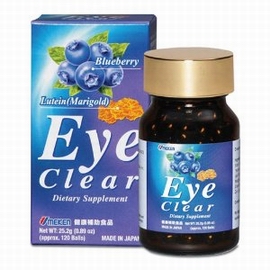 dustries and DSM Nutritional have hosted a Vision Congress in Lisbon with world-renowned experts presenting results and insights from the latest research on lutein and eye health. Attendees included researchers, eye health professionals and representatives from leading eye supplement providers.
dustries and DSM Nutritional have hosted a Vision Congress in Lisbon with world-renowned experts presenting results and insights from the latest research on lutein and eye health. Attendees included researchers, eye health professionals and representatives from leading eye supplement providers.“The purpose of the event was to continue to advance the dialog among stakeholders in the field of ocular nutrition,” said Jeff Flora, president of Kemin Industries’ human nutrition and health division.“This event provides an opportunity for broad audiences to come together to learn about the latest science and further their understanding of the latest industry trends.”
Numerous studies and clinical trials are said to provide evidence of the vital role of lutein and zeaxanthin in eye health. Deposited in the macula and lens, these dietary carotenoids act as “internal sunglasses” protecting the eye against light-induced oxidative damage.
Healthy vision is an important factor for quality of life. However, age-related eye diseases will continue to increase due to aging populations. Age-related macular degeneration (AMD) is the leading cause of irreversible visual loss among elderly populations in developing nations, according to Kemin. Epidemiological evidence suggests potential eye health benefits from dietary exposure of the macular pigments lutein and zeaxanthin. The macular pigments absorb blue light and act as a filter that may reduce photochemical damage caused by short-wavelength visible light. Consuming lutein and zeaxanthin – through dietary sources or food supplements – increases macular pigment optical density (MPOD) in human eyes. Studies suggest that higher levels of MPOD are associated with a decreased risk of AMD and improved visual function.
Dr. Rubens Belfort Jr. from Federal University of São Paulo opened the Vision Congress, highlighting the importance and function of different eye structures, age-related macular disease and related eye pathologies affecting the aging population.
Prof. J. Dawczynski from the University Hospital of Leipzig presented the results of the LUTEGA study, which looked at long term effects of lutein, zeaxanthin and omega-3 long-chain polyunsaturated fatty acids (LCPUFAs) supplementation on optical density of macular pigment in AMD patients. Results showed that supplementation with dietary macular carotenoids and omega-3-LCPUFAs may be beneficial for AMD patients. FloraGLO Lutein, which Kemin says is the most clinically researched lutein brand worldwide, was the lutein used in the supplement provided to patients.
Results from the Zeaxanthin Visual Function Study (ZVF) and Lutein Antioxidant Supplementation Trial (LAST) were presented by Dr. Stuart Richer from James A. Lovell Federal Health Care Center, North Chicago, Illinois, U.S. Results showed lutein and zeaxanthin may help to improve visual function and performance in AMD patients, namely by contributing to improved night driving skills, visual acuity and shape discrimination, photopic contrast sensitivity and glare recovery times. A complementary role between lutein and zeaxanthin was observed for some of the assessed parameters.
Improvements in visual performance and visual comfort parameters have been associated with lutein and zeaxanthin supplementation, as highlighted by Prof. B. Randall Hammond from the University of Georgia. Hammond also addressed the importance of lutein and zeaxanthin across the lifespan and presented exciting data indicating a role for lutein in brain function.
Dr. John Paul SanGiovanni, of the National Eye Institute, presented the primary and secondary analysis of the latest Age-Related Eye Disease Study 2 (AREDS2) results. He noted that the dietary supplements lutein and zeaxanthin helped reduce the progression of AMD. People reporting lowest intakes of lutein and zeaxanthin from dietary sources were less likely to progress to advanced AMD if they took the AREDS2 dietary supplement with lutein and zeaxanthin.
Cynthia Rousselot, from EAS Strategic Advice, guided the group through the challenging European Union claims procedures and implementation of the regulation, presenting the latest updates and practical impact for eye care supplement products. Finally, Peter Wennestrom, from The Healthy Marketing Team, shared innovative marketing ideas and concepts for functional ingredients in the Health Claims European Food Safety Authority era.
According to Kemin, the congress reiterated that lutein benefits different parameters of eye health. Many studies show supplementation with FloraGLO Lutein increases MPOD levels, improves visual function and reduces the risk of age-related eye diseases. Thus, increasing the consumption of lutein may be a safe, easy and effective measure to improve macular health.
FloraGLO Lutein is intended for inclusion in food supplements or as an ingredient for use in foods and beverages. Kemin and DSM have joined forces and are working under an exclusive strategic alliance to globally commercialize FloraGLO Lutein products.
Proceedings from the Vision Congress will be published and made available by Kemin and DSM in the near future.







